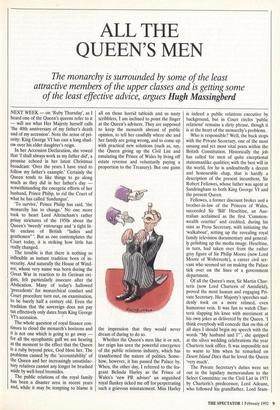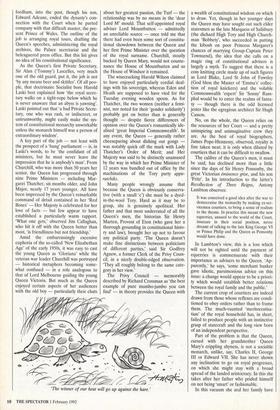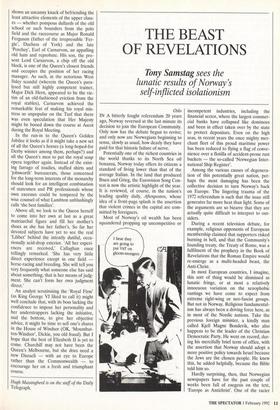ALL THE QUEEN'S MEN
The monarchy is surrounded by some of the least attractive members of the upper classes and is getting some
of the least effective advice, argues Hugh Massingberd NEXT WEEK — on 'Ruby Thursday', as I heard one of the Queen's queens refer to it — will see what Her Majesty herself calls 'the 40th anniversary of my father's death and of my accession'. Note the sense of pri- ority: King George VI has cast a long shad- ow over his elder daughter's reign.
In her Accession Declaration, she vowed that 'I shall always work as my father did', a promise echoed in her latest Christmas broadcast: 'Over the years I have tried to follow my father's example.' Certainly the Queen tends to like things to go along much as they did in her father's day — notwithstanding the energetic efforts of her husband, Prince Philip, to rid the Court of what he has called lundungus'.
'To survive,' Prince Philip has said, 'the monarchy has to change.' No one more took to heart Lord Altrincham's rather prissy strictures of the 1950s about the Queen's 'tweedy' entourage and 'a tight lit- tle enclave of British "ladies and gentlemen" '. But as one contemplates the Court today, it is striking how little has really changed.
The trouble is that there is nothing so inflexible as instant tradition born of in- security. And naturally the House of Wind- sor, whose very name was born during the Great War in reaction to its German ori- gins, felt particularly insecure after the Abdication. Many of today's hallowed 'precedents' for monarchical conduct and Court procedure turn out, on examination, to be barely half a century old. Even the tradition that the sovereign does not pay tax effectively only dates froin King George VI's accession.
The whole question of royal finance con- tinues to cloud the monarch's horizons and a is not one which is going to go away — for all the sycophantic guff we are hearing at the moment to the effect that the Queen Is a ruby beyond price, God bless her. The problems caused by the 'accountability' of the Queen and her increasingly unsatisfac- tory relatives cannot any longer be brushed aside by well-bred bromides.
The public relations of the royal family has been a disaster area in recent years and, while it may be tempting to blame it all on those horrid tabloids and us nasty scribblers, I am inclined to point the finger at the Queen's advisers. They are supposed to keep the monarch abreast of public opinion, to tell her candidly where she and her family are going wrong, and to come up with practical new solutions (such as, say, the Queen giving up the Civil List and emulating the Prince of Wales by living off estate revenue and voluntarily paying a proportion to the Treasury). But one gains the impression that they would never dream of daring to do so.
Whether the Queen's men like it or not, her reign has seen the powerful emergence of the public relations industry, which has transformed the nature of politics. Some- how, however, it has passed the Palace by. When, the other day, I referred to the fra- grant Belinda Harley as the Prince of Wales's 'new PR adviser' an anguished royal flunkey ticked me off for perpetrating such a grievous misstatement. Miss Harley is indeed a public relations executive by background, but in Court circles 'public relations' remains a dirty phrase, though it is at the heart of the monarchy's problems.
Who is responsible? Well, the buck stops with the Private Secretary, one of the most unsung and yet most vital posts within the British Constitution. Historically the job has called for men of quite exceptional statesmanlike qualities; with the best will in the world, for he is undoubtedly a decent and honourable chap, that is hardly a description of the present incumbent, Sir Robert Fellowes, whose father was agent at Sandringham to both King George VI and the present Queen.
Fellowes, a former discount broker and a brother-in-law of the Princess of Wales, succeeded Sir 'Bill' Heseltine, an Aus- tralian acclaimed as the first 'Common- wealth courtier' and credited, during his stint as Press Secretary, with initiating the 'walkabout', setting up the revealing royal family television documentary and general- ly polishing up the media image. Heseltine, in turn, had taken over from the rather grey figure of Sir Philip Moore (now Lord Moore of Wolvercote), a career civil ser- vant who seemed set on making the Palace tick over on the lines of a government department.
Of all the Queen's men, Sir Martin Char- teris (now Lord Charteris of Arnisfield), proved the most human and engaging Pri- vate Secretary. Her Majesty's speeches sud- denly took on a more relaxed, even humorous vein. It was fun to watch Char- teris slapping his knee with merriment at his own jokes as delivered by the Queen. '1 think everybody will concede that on this of all days I should begin my speech with the words "My husband and I", she quipped at the silver wedding celebrations the year Charteris took office. It was impossible not to warm to him when he remarked on Desert Island Discs that he loved the Queen 'very much'.
The Private Secretary's duties were set out in the lapidary memorandum to the Select Committee on the Civil List in 1971 by Charteris's predecessor, Lord Adeane, who followed his grandfather, Lord Stam- fordham, into the post, though his son, Edward Adeane, ended the dynasty's con- nection with the Court when he parted company with that difficult master, the pre- sent Prince of Wales. The outline of the job is arranging royal tours, drafting the Queen's speeches, administering the royal archives, the Palace secretariat and the beleaguered press office. But this list gives no idea of his constitutional significance.
As the Queen's first Private Secretary, Sir Alan ('Tommy') Lascelles, very much one of the old guard, put it, the job is not `by any means beer and skittles'. Of all peo- ple, that doctrinaire Socialist bore Harold Laski best explained how 'the royal secre- tary walks on a tight-rope below which he is never unaware that an abyss is yawning'. Laski pointed out that 'a bad Private Secre- tary, one who was rash, or indiscreet, or untrustworthy, might easily make the sys- tem of constitutional monarchy unworkable unless the monarch himself was a person of extraordinary wisdom'.
A key part of the job — not least with the prospect of a 'hung' parliament — is, in Laski's words, to be 'the confidant of all ministers, but he must never leave the impression that he is anybody's man'. From Churchill, who was more than 50 years her senior, the Queen has progressed through nine Prime Ministers — including Mar- garet Thatcher, six months older, and John Major, nearly 17 years younger. All have been impressed by the Queen's remarkable command of detail contained in her 'Red Boxes' — Her Majesty is celebrated for her love of facts — but few appear to have established a particularly warm rapport. 'What one gets,' observed Jim Callaghan, who hit it off with the Queen better than most, 'is friendliness but not friendship.'
Amid the embarrassingly excessive euphoria of the so-called 'New Elizabethan Age' of the early 1950s, it was easy to cast the young Queen as `Gloriana' while the veteran war leader Churchill was portrayed — historical metaphors becoming some- what confused — in a role analogous to that of Lord Melbourne guiding the young Queen Victoria. But much as the Queen enjoyed certain aspects of her audiences with the old boy — particularly their chats
about her greatest passion, the Turf — the relationship was by no means in the 'dear Lord M' mould. That self-appointed royal adviser Lord Mountbatten — admittedly an unreliable source — once told me that there had even been some sort of constitu- tional showdown between the Queen and her first Prime Minister over the question of the royal surname. Churchill, stoutly backed by Queen Mary, would not counte- nance the House of Mountbatten and so the House of Windsor it remained.
The wisecracking Harold Wilson claimed to have enjoyed particularly cordial deal- ings with his sovereign, whereas Eden and Heath are supposed to have vied for the Tuesday evening wooden spoon. As for Thatcher, the two women (neither a femi- nist, nor noted for their 'gender solidarity') probably got on better than is generally thought — despite fierce differences of opinion over the Queen's romantically ide- alised 'great Imperial Commonwealth'. In any event, the Queen — generally rather cheeseparing about dishing out gongs — was notably quick off the mark with Lady Thatcher's Order of Merit; and Her Majesty was said to be distinctly unamused by the way in which her Prime Minister of 12 years was bundled out of office by the machinations of the Tory party appa- ratchiks.
Many people wrongly assume that because the Queen is obviously conserva- tive (with a small 'c') she must be a dyed- in-the-wool Tory. Hard as it may be to grasp, she is genuinely apolitical. Her father and that most underrated of all the Queen's men, the historian Sir Henry Marten, Provost of Eton (who gave her a thorough grounding in constitutional histo- ry and law), brought her up not t6 favour any political party. 'The Queen doesn't make fine distinctions between politicians of different parties,' said Sir Godfrey Agnew, a former Clerk of the Privy Coun- cil, in a nicely double-edged observation. 'They all roughly belong to the same cate- gory in her view.'
The Privy Council — memorably described by Richard Crossman as 'the best example of pure mumbo-jumbo you can find' — in theory provides the Queen with
The winner of our heat will go up against the hare.' a wealth of constitutional wisdom on which to draw. Yet, though in her younger days the Queen may have sought out such elder statesmen as the late Marquess of Salisbury (the diehard High Tory and High Church- man 'Bobbety', who succeeded in putting the kibosh on poor Princess Margaret's chances of marrying Group-Captain Peter Townsend), the idea that she calls on a magic ring of constitutional advisers is largely a myth. To suggest that there is a cosy knitting circle made up of such figures as Lord Blake, Lord St John of Fawsley (God bless the Master of 'Emma's' collec- tion of royal knickers) and the voluble Commonwealth 'expert' Sir 'Sonny' Ram- phal would be to enter the realms of fanta- sy — though there is the odd licensed jester like the egregious architect Sir Hugh Casson.
No, on the whole, the Queen relies on the resources of her Court — and a pretty uninspiring and unimaginative crew they are. As the best of royal biographers, James Pope-Hennessy, observed, royalty is fine taken neat; it is only when diluted by courtiers that it can be difficult to swallow.
The calibre of the Queen's men, it must be said, has declined more than a little since the days of Sir Henry Ponsonby, the great Victorian eminence grise, and his son 'Fritz'. In his introduction to the latter's Recollection of Three Reigns, Antony Lambton observes:
It was conceived a good idea after the war to democratise the monarchy by making ex-ser- vicemen courtiers, to bring a sense of realism to the throne. In practice this meant the new equerries, unused to the world of the Court, insecure in their social position, never dreamt of talking to the late King George VI or Prince Philip and the Queen as Ponsonby would have done.
In Lambton's view, this is a loss which will not be righted until the payment of equerries is commensurate with their importance as advisers to the Queen. 'Ap- parently,' he says, 'some merchant banker gave idiotic, parsimonious advice on this issue: a change would appear to be a priori- ty which would establish better relations between the royal family and the public.'
The current crop of courtiers are indeed drawn from those whose reflexes are condi- tioned to obey orders rather than to frame them. The much-vaunted `meritocratisa- tion' of the royal household has, in short, failed to produce people with an instinctive grasp of statecraft and the long view born of an independent perspective.
Part of the problem is that the Queen, cursed with her grandmother Queen Mary's crippling shyness, is not a sociable monarch, unlike, say, Charles II, George III or Edward VII. She has never shown any inclination to go on royal progresses, on which she might stay with a broad spread of the landed aristocracy. In this she takes after her father who prided himself on not being 'smart' or fashionable.
In this vacuum she and her family have shown an uncanny knack of befriending the
least attractive elements of the upper class- es — whether pompous dullards of the old
school or such bounders from the polo field and the racecourse as Major Ronald Ferguson (father of the irrepressible 'Fer- gie', Duchess of York) and the late 'Porchey', Earl of Carnarvon, an appalling old ham and reprobate. His son, the pre- sent Lord Carnarvon, a chip off the old block, is one of the Queen's closest friends and occupies the position of her racing manager. As such, in the notorious West Ilsley scandal (wherein the Queen's para- lysed but still highly competent trainer, Major Dick Hem, appeared to be the vic- tim of an old-fashioned eviction from the royal stables), Carnarvon achieved the remarkable feat of making his royal mis- tress so unpopular on the Turf that there was even speculation that Her Majesty might be booed down the course at Ascot during the Royal Meeting.
In the run-in to the Queen's Golden Jubilee it looks as if it might take a new set of all the Queen's horses (a long-hoped-for Derby winner among them, perhaps?) and all the Queen's men to put the royal soap opera together again. Instead of the exist- ing farrago of toadies, stuffed shirts and lobsworth' bureaucrats, those concerned for the long-term interests of the monarchy should look for an intelligent combination of statesmen and PR professionals whose own excesses could be tempered by the wise counsel of what Lambton unblushingly calls 'the best families'.
Above all, we look to the Queen herself to come into her own at last as a great matriarchal figure and fill her mother's shoes as she has her father's. So far her devoted subjects have yet to see the real `Lilibet' behind the intently dutiful, occa- sionally acid-drop exterior. 'All her experi- ences are received,' Callaghan once tellingly remarked. 'She has very little direct experience except in one field — horse-racing and breeding. She will tell you very frequently what someone else has said about something; that is her means of judg- ment. She can't form her own judgment direct.'
An analyst scrutinising the 'Royal Firm' (as King George VI liked to call it) might well conclude that, with its boss lacking the confidence to impose her personality and her understrappers lacking the initiative, and the bottom, to give her objective advice, it might be time to sell one's shares in the House of Windsor (OK, 'Mountbat- ten-Windsor', Dickie, you old fraud). But I hope that the best of Elizabeth II is yet to come. Churchill may not have been the
Queen's Melbourne, but she does need a new Disraeli — with an eye to Europe
rather than the Commonwealth — to encourage her on a fresh and triumphant course.




















































 Previous page
Previous page